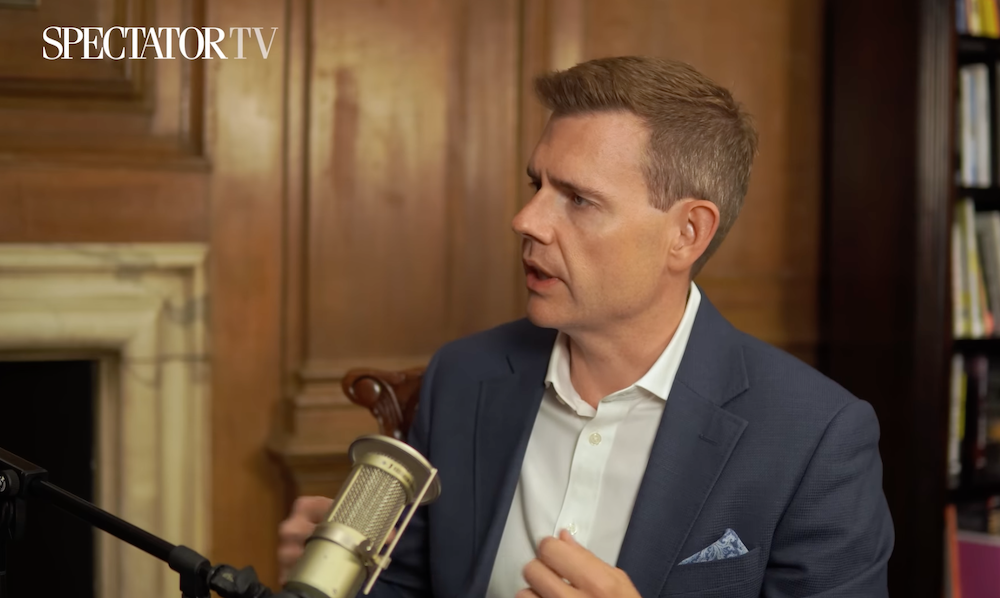Donald Trump touches down in Scotland today on what is ostensibly a private visit to open an 18-hole golf course dedicated to his mother, Mary Anne MacLeod, who was born on the Isle of Lewis. The State Visit isn’t until September. But Police Scotland aren’t taking any chances.
Trump will be pursued by a ragged coalition of Scottish Green Party activists, Pro-Palestinian groups and trades unionists
Around six thousand officers, including many drafted in from across the UK, will be on duty as the US president perambulates around his golf courses at Turnberry in Ayrshire and the Menie Estate near Aberdeen, pursued by a ragged coalition of Scottish Green Party activists, Pro-Palestinian groups and trades unionists who have pledged to ‘Stop Trump’ before he meets the prime minister, Keir Starmer, on Monday.
But is all this police firepower really necessary? These are changed days since Trump’s last visit to Scotland as president in 2018. Back then, demonstrators like the late comedian, Janey Godley, with her infamous ‘Trump is a C*nt’ placard, seemed to capture the popular mood, as thousands took part in a ‘Festival of Resistance’. Her close friend, the former First Minister Nicola Sturgeon, pointedly avoided meeting Trump on the grounds that he was a ‘pussy grabbing misogynist’ and other bad things.
This time around, her successor, John Swinney, is making every effort to schmooze the US leader – not least to promote trade with Scotland’s biggest trading partner, worth nearly £4 billion a year. More than 100,000 Scots are employed by US firms, mainly in pharmaceuticals, technology and energy. The Scottish government is more interested in winning back US tourist dollars that fell away after Covid than accusing their elected leader of being a fascist.
Trump is also being promised a ‘warm welcome’ by the Labour Scottish Secretary, Ian Murray – and no, that isn’t irony. The Edinburgh MP told BBC Scotland that he regards it as his ‘duty’ to maintain good relations with Trump in the ‘national interest’. Yet in 2019 Murray voted in favour of a Commons motion condemning Trump’s ‘misogyny, racism, and xenophobia’. Perhaps Scotland has grown up a little since those days of gesture politics.
The SNP’s Westminster leader, Stephen Flynn, still playing to the nationalist gallery, says he’ll be ‘washing his hair’ for the duration of the visit. And it seems most Scots will be staying away too; at least from the demonstrations. There is less enthusiasm these days for pointless expressions of impotent rage.
The Scottish Green party, which is leading the attempt to block the ‘climate change denying convicted felon’ from Scotland’s green and pleasant land has itself fallen from grace. It is no longer in government, having been expelled from the SNP-led coalition following policy disasters over gender reform, rent freezes and plans to scrap millions of gas boilers.
Instead, Scotland now has its own emerging MAGA-style movement in Nigel Farage’s Reform UK, which is expected to elect a bloc of up to 14 MSPs in the Scottish parliament next year. That would have been unthinkable in 2018. Then Farage was a pariah, famously driven to seek refuge in a pub during a visit to Edinburgh’s Royal Mile a few years earlier.
Immigration is not the driving force behind the rise of national populism in Scotland. The major issues here are ever-rising NHS waiting lists, ever-increasing income taxes, and the excesses of gender ideology, currently dominating headlines from the Sandie Peggie employment tribunal in Dundee, where the NHS is accused of victimising a gender-critical nurse after she objected to undressing before a trans doctor.
Reform is also exploiting disquiet over the hectic decline of the North Sea oil and gas industry, which employs around 100,000 workers. The GMB union, along with Aberdeen and Grampian Chambers of Commerce, will be echoing Trump’s call for the UK government to lift its ban on North Sea oil exploration and scrap punitive windfall taxes on energy profits.
There is less enthusiasm these days for pointless expressions of impotent rage
Trump will no doubt give Keir Starmer an ear-bashing about ‘windmills’ when he meets the PM on Monday. Starmer is hoping to seal the deal on the much-vaunted trade deal and end punitive tariffs on cars, pharmaceuticals and, yes, Scots whisky. Like Swinney he will express ‘concern’ about suffering in Gaza without echoing the cries of ‘genocide’ from activists outside.
This weekend’s ‘Stop Trump’ demos will be significant mainly for demonstrating the political irrelevance of the nationalist left after nearly two decades of in which it wielded considerable influence in Scotland. The times, they are a-changing.
Of course, Trump will not be met by cheering crowds; the popular response will be studied indifference. Scottish voters have too much on their minds right now to indulge in petty and undemocratic jeering at a man who has been elected, not once, but twice, by American voters. And who has seen the downfall of his bête noire, Nicola Sturgeon.








Comments